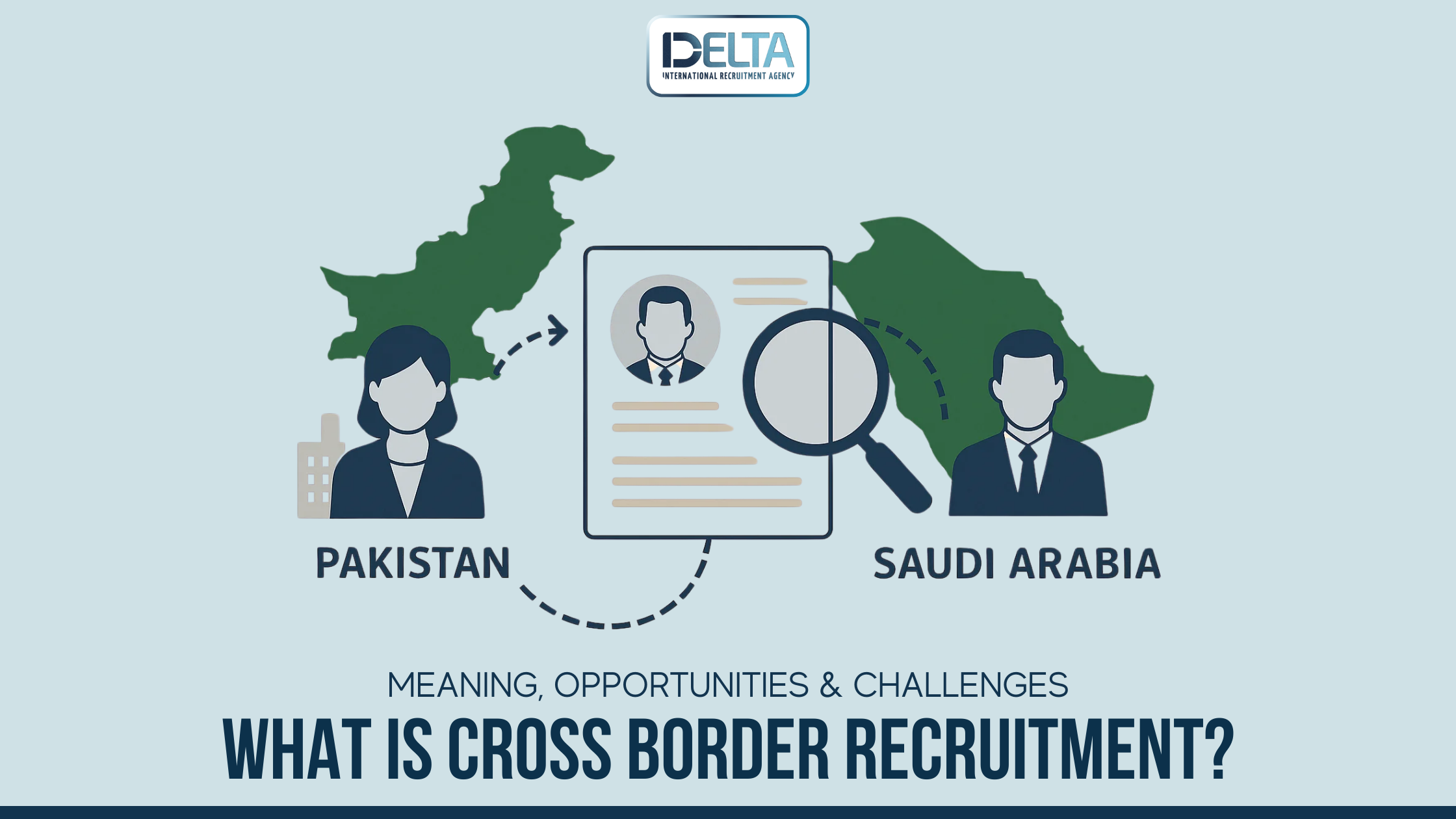Expanding your business globally in today's interconnected world requires access to diverse talent pools across various geographical regions. Finding skilled professionals who align with your organizational needs can be particularly challenging when limited to local markets.
That's where cross border recruitment comes into play—a strategic approach that enables businesses to overcome talent shortages and tap into global expertise. Whether you're a multinational corporation or a growing enterprise looking to expand, understanding the fundamentals of cross border recruitment can significantly enhance your talent acquisition strategy.
As businesses face increasing pressure to stay competitive amid skills shortages and market expansions, cross border recruitment has emerged as a powerful solution.

Image Made by Sora
In this comprehensive guide, we'll explore what cross border recruitment entails, how it differs from conventional hiring practices, the opportunities it presents for forward-thinking organizations, and the challenges you might encounter along the way. We'll also provide insights into partnering with specialized cross border recruitment agencies in Pakistan to streamline your international hiring process. By the end of this article, you'll have a clearer understanding of how cross border recruitment can transform your talent acquisition strategy and drive business growth in global markets.
Meaning of Cross Border Recruitment?
Cross border recruitment refers to the practice of hiring and employing talent from countries other than a company's home base. For instance, a business headquartered in the Saudi Arabia might recruit technical specialists from India or customer service representatives from the Philippines to fulfill specific organizational needs.
This international hiring approach has gained significant momentum in recent years, largely driven by globalization, technological advancements, and the rise of remote work arrangements. Cross border recruitment enables organizations to access a wider talent pool, overcome local skills shortages, and strategically expand into new markets with relevant expertise.
The concept extends beyond simply hiring foreign workers. It encompasses a comprehensive process that includes identifying international talent markets, understanding regional employment laws and cultural nuances, developing specialized recruitment strategies, conducting remote interviews and assessments, and ultimately onboarding employees across geographical boundaries.
Cross border recruitment can also be referred to as international recruitment or global recruitment in certain contexts. Some organizations might even expand this definition to include hiring expatriates or temporary travelers who are seeking lower costs of living and greater flexibility by relocating from higher-cost regions to emerging markets.
Research from EY highlights the growing popularity of cross border careers, with 93% of workers viewing international work as a life-changing opportunity. Similarly, 88% of HR professionals recognize the value of mobility in addressing global talent shortages, indicating a significant shift toward more borderless employment practices.
How Normal Recruitment Differs from Cross Border Recruitment
Traditional recruitment and cross border recruitment differ significantly in their scope, complexity, and strategic implications. Understanding these differences is crucial for organizations looking to expand their talent acquisition beyond domestic borders.
Geographical Scope and Talent Pool
Normal recruitment typically focuses on sourcing candidates within the same country or region where a business operates. The talent search is constrained by geographical proximity, often limiting opportunities to find specialized skills.
In contrast, cross border recruitment expands the talent search globally, allowing companies to access a vastly larger and more diverse pool of candidates. This broader reach is particularly valuable for roles requiring specialized expertise that might be scarce in the domestic market.
Legal and Compliance Considerations
Domestic recruitment operates within a single legal framework, making compliance management relatively straightforward. HR teams work with familiar employment laws, tax regulations, and industry standards specific to their country.
Cross border recruitment involves navigating multiple legal systems simultaneously. Companies must comply with distinct employment laws, tax requirements, immigration regulations, and mandatory benefits across different countries. This complexity creates additional compliance risks that require specialized knowledge and careful management.
Cultural and Communication Challenges
Traditional recruitment processes typically involve candidates who share similar cultural backgrounds, business practices, and communication styles with the hiring organization, minimizing potential misunderstandings or cultural barriers.
International recruitment necessitates cultural sensitivity and awareness of different business norms across regions. Communication can be complicated by language differences, varying interview expectations, and diverse work cultures. Companies must adapt their recruitment and onboarding approaches to accommodate these cultural nuances.
Logistical Complexities
Normal recruitment benefits from simpler logistics, with face-to-face interviews, standardized documentation processes, and established onboarding procedures tailored to local requirements.
Cross border recruitment introduces logistical challenges such as coordinating across multiple time zones, conducting virtual interviews, managing international documentation, facilitating work permits or visas, and developing remote onboarding protocols. These complexities require more sophisticated recruitment technologies and processes.
Cost Structures and Compensation Strategies
Domestic recruitment operates with relatively consistent compensation benchmarks and a clear understanding of local market rates, benefits expectations, and cost of living factors.
International hiring requires developing market-specific compensation strategies that account for regional wage differences, varying living standards, local benefits requirements, and currency considerations. Organizations must balance competitive offers with cost efficiency when recruiting across borders.
Hiring Models and Employment Structures
Traditional recruitment typically follows standard employment models established within the company's home country, with direct employment relationships governed by familiar contractual frameworks.
Cross border recruitment often requires selecting from various hiring models, including entity establishment, contractor engagement, or partnering with an Employer of Record (EOR). Each approach has distinct implications for legal compliance, administrative responsibilities, and employer-employee relationships.
Opportunities Cross Border Recruitment Can Create!
Cross border recruitment opens up a world of possibilities for organizations looking to gain a competitive edge in today's global marketplace. Here are the key opportunities this approach offers:
Access to Specialized Global Talent
Cross border recruitment dramatically expands your access to specialized talent that might be scarce or unavailable in your domestic market. This global reach is particularly valuable for roles requiring niche technical skills, industry-specific expertise, or specialized knowledge.
For instance, a technology company based in Europe might tap into the rich talent pool of software engineers in Eastern Europe or Asia to fill critical development roles. Similarly, businesses looking to expand into new regional markets can benefit from hiring local experts who understand the target market's dynamics, consumer preferences, and business landscape.
Strategic Cost Advantages
One of the most compelling benefits of cross border recruitment is the potential for cost optimization. By recruiting from regions with lower salary expectations and living costs, organizations can secure top talent at more competitive rates while offering attractive compensation packages to employees.
For example, a North American company might hire qualified professionals from Southeast Asia or Latin America, where salaries for equivalent positions are typically lower. These cost efficiencies allow businesses to reinvest savings into other growth initiatives, innovation, or employee development programs.
Accelerated Market Expansion
Cross border recruitment can serve as a powerful catalyst for international market expansion. Hiring local talent in target markets provides immediate access to essential regional knowledge, including:
- Cultural nuances and consumer behaviors
- Local business practices and industry connections
- Regulatory frameworks and compliance requirements
- Market-specific challenges and opportunities
This localized expertise helps companies navigate new markets more effectively, minimize cultural missteps, and establish authentic connections with local customers and partners.
Enhanced Innovation Through Diversity
Global teams bring together diverse perspectives, experiences, and problem-solving approaches. This diversity fuels innovation and creative thinking within organizations, leading to:
- Fresh approaches to persistent challenges
- Novel product ideas tailored to different market needs
- More comprehensive risk assessment and opportunity identification
- Enhanced adaptability to global market shifts
Research consistently shows that diverse teams outperform homogeneous ones, with studies indicating that companies with above-average diversity produce 19% higher innovation revenues.
24/7 Operational Capability
Strategically distributed cross border teams create the opportunity for around-the-clock operations. With team members working across different time zones, organizations can provide continuous customer support, development workflows, and business operations without requiring night shifts in a single location.
This global coverage improves customer satisfaction through faster response times and extended service hours while accelerating project timelines by facilitating continuous progress across distributed teams.

Why Delta International Recruitment Agency Offers the Best Recruitment Solutions
What Challenges Make Cross Border Recruitment A Little Hard
While cross border recruitment offers numerous advantages, it also presents several challenges that organizations must navigate carefully. Understanding and addressing these obstacles is crucial for successful implementation of international hiring strategies.
Complex Legal Requirements
One of the most significant challenges of cross border recruitment is complying with varying legal frameworks across different countries. Each jurisdiction has its own:
- Employment laws and labor regulations
- Tax requirements and reporting obligations
- Worker classification standards
- Mandatory benefits and entitlements
- Immigration policies and work permit procedures
Non-compliance with these requirements can result in hefty fines, legal disputes, operational disruptions, and reputational damage. Without specialized knowledge in international employment law, organizations risk making costly mistakes that could undermine their global expansion efforts.
Overcoming Cultural and Language Barriers
Cultural differences present multifaceted challenges throughout the recruitment process and beyond. Variations in communication styles, business etiquette, interview expectations, and workplace norms can create misunderstandings and friction if not properly addressed.
For example, candidates from some cultures may be reluctant to highlight their achievements during interviews due to cultural modesty values, while others might communicate more directly than what's typical in your organization's home culture. Similarly, expectations around management styles, feedback practices, and work-life boundaries can vary significantly across regions.
Language differences further complicate cross border recruitment, potentially creating barriers during:
- Job description translations and interpretations
- Interview assessments and candidate evaluations
- Contract negotiations and documentation
- Onboarding processes and team integration
Organizations must develop culturally sensitive recruitment practices and provide appropriate language support to overcome these challenges effectively.
Managing Technical and Logistical Hurdles
Cross border recruitment introduces various technical and logistical complexities that can hinder the hiring process. These include:
- Time zone differences that complicate scheduling interviews and meetings
- Technology compatibility issues across different regions
- Varying internet reliability and digital infrastructure
- Document verification across different credential systems
- Remote onboarding and training challenges
Without proper tools and processes to address these logistical hurdles, cross border recruitment can become inefficient and frustrating for both employers and candidates.
Ensuring Consistent Payroll and Benefits Administration
Managing payroll and benefits across multiple countries introduces considerable complexity for HR and finance teams. Organizations must navigate:
- Different payment systems and banking regulations
- Currency conversion and fluctuation risks
- Country-specific tax withholding requirements
- Varying benefits expectations and mandates
- Complex record-keeping across jurisdictions
Ensuring timely and accurate compensation while remaining compliant with local requirements demands specialized expertise and robust systems.
Building Cohesive Remote Teams
Creating a unified company culture and maintaining team cohesion across geographical boundaries presents ongoing challenges. Remote cross border teams may struggle with:
- Limited face-to-face interaction and relationship building
- Reduced informal knowledge sharing and collaboration
- Varying work styles and expectations
- Communication gaps and misalignments
- Feelings of isolation or disconnection
These challenges require intentional strategies for team building, communication, and inclusion to ensure cross border employees feel fully integrated into the organization.
Partner With Cross Border Recruitment Agency in Pakistan
For organizations looking to optimize their international hiring efforts, partnering with a specialized Cross Border Recruitment Agency in Pakistan for Saudi Arabia offers a strategic advantage like Delta International Recruitment Agency. These agencies bring valuable expertise and resources to streamline the complex process of hiring across borders.
Why Choose Pakistan for Cross Border Recruitment Partners?
Pakistan has emerged as a significant hub for cross border recruitment services due to several favorable factors:
- Pakistan produces approximately 500,000 university graduates annually, including specialists in IT, engineering, finance, and healthcare.
- Pakistani recruitment agencies offer competitive rates compared to similar services in Western countries, providing excellent value while maintaining quality standards.
- Pakistan's geographical position allows for overlapping business hours with both Asian and European markets, facilitating smoother communication across regions.
- The country has experienced significant improvements in digital connectivity, enabling efficient virtual recruitment processes and remote collaboration.
Services Offered by Cross Border Recruitment Agencies
Reputable cross border recruitment agencies in Pakistan typically provide comprehensive services that address the full spectrum of international hiring needs:
- Global Talent Sourcing
- Legal Compliance Management
- Cultural Assessment and Adaptation
- Remote Interview Coordination
- Background Verification
- Onboarding Support
Selecting the Right Cross Border Recruitment Partner
When choosing a cross border recruitment agency in Pakistan, consider these key factors to ensure a successful partnership:
- Look for agencies with expertise in your specific industry and demonstrated success in recruiting for similar roles.
- Assess the agency's international connections and their ability to access talent pools in your target regions.
- Evaluate their digital infrastructure, including virtual interview platforms, applicant tracking systems, and remote assessment tools.
- Verify their knowledge of international employment laws and their track record in managing cross border compliance requirements.
- Seek testimonials or case studies from other international organizations that have utilized their services.
- Gauge their understanding of cultural nuances and their ability to bridge cultural gaps between your organization and potential candidates.
Partnering with the right cross border recruitment agency in Pakistan can significantly enhance your global talent acquisition strategy, reduce legal risks, and accelerate your international expansion plans while controlling recruitment costs and improving candidate quality.
Conclusion
Cross border recruitment represents a powerful strategy for organizations seeking to overcome talent shortages, expand into new markets, and enhance their competitive advantage in today's globalized business environment. By understanding what cross border recruitment entails and how it differs from traditional hiring practices, companies can make informed decisions about their international talent acquisition approach.
The opportunities created through cross border recruitment—including access to specialized global talent, cost advantages, accelerated market expansion, enhanced innovation, and 24/7 operational capabilities—make it an attractive option for forward-thinking organizations. However, the challenges of navigating complex legal requirements, overcoming cultural barriers, managing logistical hurdles, ensuring consistent payroll administration, and building cohesive remote teams require careful consideration and specialized expertise.
Tips for Employers: Overseas Recruting



.jpg)
